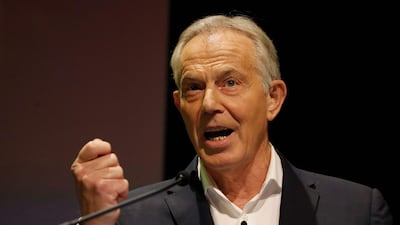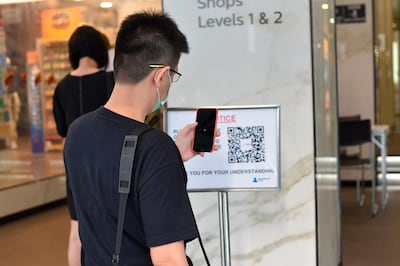Tony Blair has called for governments around the world to give each resident a digital identity to enable the resumption of normal activity and ensure retraining for citizens to promote economic recovery.
Predicting a sharp downturn in the economy as a result of the coronavirus pandemic, Mr Blair said the world needed a common, digital platform for recovery. Both before and after the outbreak of Covid-19 Mr Blair said technology represented a transformation for humankind to equal the Industrial Revolution more than two centuries ago.
The former British prime minister told an online conference on artificial intelligence, CogX, that restarting social and workplace interaction presented formidable challenges.
The foremost was certifying those who had contracted Covid-19 so that they could undertake unrestrained activities and carry a portable record of their disease status.
"When I look at how you restart businesses and international travel, unless you're able to record people's disease status in a way that can be used, it's going to be difficult to go back to anything like a near normal," he said. "Unless you are able to do testing and have somewhere to record it you are not going to go back."
As for the current situation, large swathes of the global economy were facing disruption or collapse, he said.
"I can’t see the travel, tourism, hospitality business coming back any time soon," he said. "Bricks and mortar retail has had its day."
Those trends compounded the need for retraining and educating the workforce with digital skills. A digital identity would provide a platform for universal access to new opportunities.
"You are going to be re-equipping people so make a virtue of it," he said.
Mr Blair explained why the coronavirus-induced shutdown would be so far-reaching, and why technology innovation was the obvious response. He said people were wrestling with two aspects of the disease: while it presented a lethal threat, the risk was not uniform to all in society.
"This is a disease that if you know enough about it, you don’t want [to get] it but the truth is only a small number of people will contract it and only a small amount of people will have it any one time," he said.
Thus the crisis was different in character from the shock to the economy delivered by the September 11, 2001, terrorist attacks in the United States and the 2008 financial crisis.
"With 9/11 or the global financial crisis these were big talking points but people carried on with their lives," he said. "The difference with this pandemic is that everyone’s life has changed."
In particular he outlined his concerns about the disruption to education and added a warning on the effect on Africa, which is still to come.
"There is great risk to an entire group of young children, usually the most socially deprived or the most economically disadvantaged, of not having an education," he said.
Many African leaders remained convinced that the cure of shutdown was worse than the toll from the disease. He said there were three open questions for the continent on the progress of the pandemic: were governments "not testing enough, [was] the spike yet to come or could it be there is an additional resistance [to Covid-19] within the population?"
Mr Blair urged governments to undergo the shock transformation that health care around the world had taken but said he was worried that bureaucracies would kill attempts to respond to the downturn with innovation.
"We've had more innovation in health care in the last 10 weeks than we’ve had in the last 10 years," he said. "Are we really saying we want to go back to face to face consultations or are we really saying with those online courses that we want to go back to lecture rooms?
"What’s going to be interesting is whether government itself can change," he added. "The toughest things are getting things done and governments don’t like change, bureaucracies have a genius for inertia."
While digitally portable 'health passports" have been described as unworkable by the World Health Organisation, Mr Blair's ideas of a digital ID reach far beyond the immediate impasse that it would address.
A report from Mr Blair's Institute of Global Change issued on Tuesday said the ID could be built on a "user-centric model of digital identity that puts individuals in control and protects their privacy".
The briefing said governments should agree "internationally interoperable standards for credentials so that they can be widely recognised by a range of organisations".
It said mobility was important and highlighted the type of QR systems used in the UAE as the cornerstone of the country's test-and-trace systems.
"States that already have a modern identity infrastructure have a head start in issuing mobility credentials, since these can be associated with specific individuals relatively easily," the 18-page briefing said. "Governments must therefore ensure that any mass, rapid testing regime also confers a mobility credential: a biometrically secured digital code (eg a QR code) stored on a person’s phone. Individuals would then present this code when entering specific settings."













